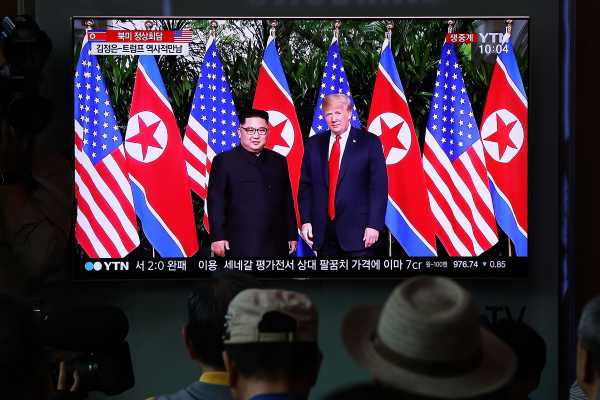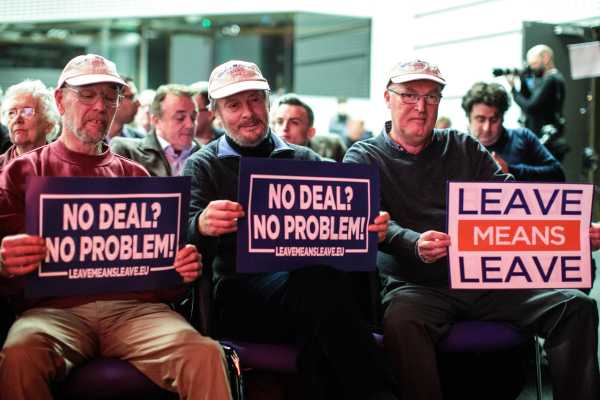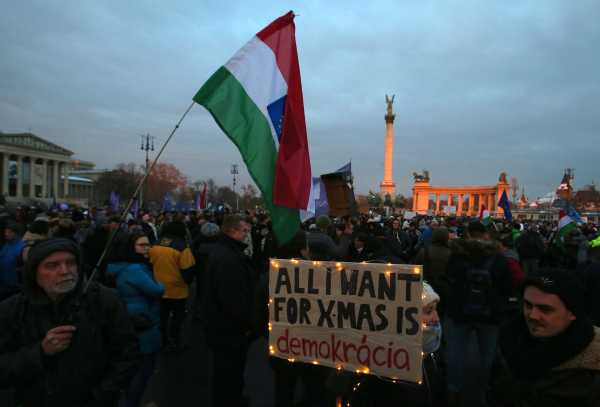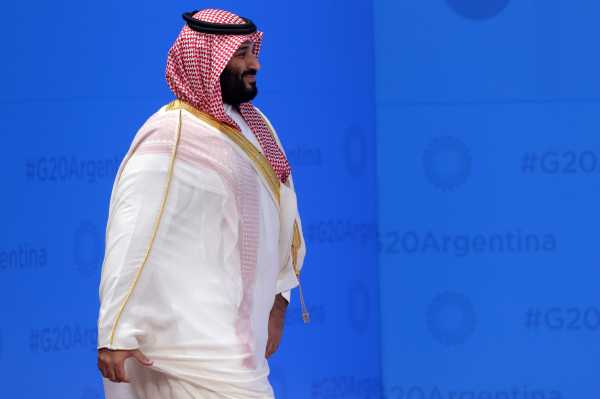
It’s a cliché, but the world is an inherently a messy place. The crises of one year are rarely contained by the calendar, spilling over for months, years, and frequently decades.
Which is why it’s a risky endeavor to try to predict the most critical global stories of 2019. But we’re going to try anyway.
The hot spots of 2019 will likely be familiar to many: Developments in North Korea, China, and the Middle East will continue to dominate, and most likely, consume US policy. Parts of the globe, even the democratic ones, will continue their flirtation with authoritarianism. President Donald Trump will tweet, and most likely find some world leader to feud with.
We won’t pretend that a new conflagration won’t emerge. It almost certainly will.
But we can be reasonably sure that the following foreign news stories will continue to dominate the world’s attention in the coming year. So, without further ado, here are the seven biggest stories to watch for in 2019.
Brexit: Deal or no deal? Or no breakup at all?

The United Kingdom is careening into the new year on a raft of political crises. Prime Minister Theresa May negotiated a Brexit deal with the European Union that everybody hated, so much so that she pulled the agreement from a scheduled Parliamentary vote in December. She soon faced a rebellion from her own Conservative Party, which she survived, if not entirely comfortably.
May has now scheduled a vote on her Brexit deal the week of January 14 — but Parliament doesn’t seem inclined to like May’s Brexit deal in 2019 any more than it did in 2018. The only difference? They’ll be voting a heck of a lot closer to the Brexit deadline of March 29, 2019.
If the UK hasn’t ratified a withdrawal agreement by that date, it will crash out of the EU without a deal, leading to scenarios that sound as if they’re ripped from the pages of a dystopian novel: food and medicine shortages; flights grounded; ports of entry backed up for miles. May’s government has stepped up contingency planning for this no-deal scenario, but the closer Britain gets to its exit date, the more dire the outcome seems.
Which is why the cries are growing increasingly louder for a second referendum — a “people’s vote” to decide the future of Brexit that would likely include an option to just remain in the European Union altogether.
“Bregret” has grown as some “Leave” voters are now recognizing that the promises of Brexit weren’t all they were cracked up to be, but the country remains bitterly divided on whether to stay with the EU or go.
So whatever happens on March 29, 2019, will likely disappoint a good chunk of the country.
US-China trade war: Tariff Man, the sequel?
The United States and China reached a modest compromise on trade on the sidelines of the G20 summit in December. Trump agreed to hold off on a planned increase in tariffs on $200 billion worth of Chinese goods on January 1, offering a 90-day reprieve to negotiate a trade deal with China.
Negotiations are reportedly planned for January, but beyond that it’s a bit of a wild card. Issues such as tariffs and even the trade deficit — America has a huge trade deficit with China, and Trump very much wants to reduce it — are areas where experts say progress seems possible.
That’s in part because tariffs are now acutely hurting parts of the US and China is starting to experience an economic slowdown. But on other issues, such as intellectual property protection, the two sides are much farther apart.
At the same time, new tensions between the two countries seem to pop up every day. The arrest of Huawei CFO Meng Wanzhou for violating Iran sanctions is already rattling relations (with Canada caught in the middle), with the US sending a warning shot to China over broader fears of Chinese espionage. That was followed up by the US indictment last week of two Chinese-government linked hackers, whom prosecutors allege infiltrated business and government systems in multiple countries and sectors to steal valuable secrets.
President Xi Jinping, meanwhile, enters the new year after consolidating power and doesn’t seem to be in a mood to back down on the international stage. At a speech last week, Xi defended his policies and China’s rise. Xi didn’t go into specifics about his trade war with the US, but he did say that “no one is in the position to dictate to the Chinese people what should and should not be done.”
Which means that 2019 could be an unpredictable one for two of the world’s superpowers. The US and China could reach a deal, or it could all fall apart, and the trade war could escalate once again.
Democracy in peril

“We are being undermined by the ‘sad passions’: nationalism, anti-semitism, extremism,” French President Emmanuel Macron said in November, marking the 100th anniversary of the armistice that ended World War I.
He was reflecting on the parallels between then and now, as countries have turned inward and democratic institutions are in retreat.
This year, 2018, saw Hungary and Poland slink further toward authoritarianism. A far-right, military-dictatorship-loving firebrand, Jair Bolsonaro, won the presidency in Brazil. Turkey’s president Recep Tayyip Erdoğan won reelection, and a sweeping set of new powers. Nicaragua is in the throes of the political crisis, with President Daniel Ortega intensifying his crackdown on civil society and the free press.
Next year will be another test for democratic countries, both established and emerging. Far-right parties will still work to destabilize Europe. Two major democracies — India and Nigeria — will face contentious, possibly course-changing elections. The United States, the so-called leader of the free world, may face a historic trial of the rule of law and its institutions in 2019, with a divided Congress and a president under increasing pressure from multiple investigations.
The list goes on — and yet, in the closing weeks of 2018, anti-government protests erupted in Hungary. In Belgrade, Serbia, thousands protested the attack on an opposition politician. Under pressure, Poland reversed a purge of the judiciary. Forces are pushing back against the rise of authoritarianism.
The question for 2019 is which side starts winning again, and where.
North Korea: A second summit, or something worse?
We may learn more about what North Korea has in store for the world in 2019 as early as January 1, when Kim Jong Un will deliver his New Year’s address. There, he may reveal what’s on his agenda, particularly when it comes to talks over his country’s nuclear program.
On December 20, the Korean Central News Agency — the regime’s official news outlet — issued a statement saying that North Korea would not denuclearize until the United States agrees to remove the nuclear threat from the Korean Peninsula and the region.
The message was essentially, “We’ll disarm when you disarm,” Vipin Narang, a professor of political science at MIT and an expert on US-North Korea relations, told me. “Until then, we can’t give up our nuclear weapons.”
If Kim reiterates this demand in his New Year’s speech, it’s going to be even harder for the Trump administration to convince itself that North Korea is dismantling its nuclear program.
After that, the pressing question will likely be: Will Trump keep pretending that’s the case, or will he finally face the increasingly obvious reality that Pyongyang not only has no intention to do so, but is actually ramping up its missile program? And if Trump finally admits Kim’s love letters are meaningless, what tools are left for the administration to address the North Korean threat?
This could also put Trump on a collision course with his own administration, Narang told me. The State Department knows that North Korea isn’t playing nice, but Trump — never one to admit he made a misstep — is continuing to buy into the fantasy.
Then again, North Korea has played this pretty well. They’ve quietly continued to expand their weapons program. “All they had to do was lay low, which is what they’ve been pretty good at for the last couple of months,” Narang said.
If Kim continues on this course, he might get what he ultimately wants: a second summit with Trump in 2019.
Saudi Arabia, Yemen, and the MBS show

The US-Saudi relationship may be the most uncertain partnership in 2019. The world is still reeling from the assassination of dissident journalist Jamal Khashoggi, and the role of the kingdom’s de facto leader, Crown Prince Mohammad bin Salman (MBS), in his murder.
Khashoggi’s death managed to unravel the ruse of MBS as the modernist reformer, laying bare his drive to power, his crackdown on free speech, and his role in the humanitarian crisis and conflict in Yemen. “The eyes of the world have been lifted to the kind of character Mohammad bin Salman is shaping up to be,” Kristian Coates Ulrichsen, a Middle East Fellow at the Baker Institute, told me.
“I think in 2019, we’ll see more of that,” he added. “One of the stories in 2019 will be the Saudis imagining the White House can protect MBS, and the White House trying to do so, but realizing, perhaps too late, that they can’t.”
Congress is one big reason why the White House might not be able to protect MBS. Trump has resisted condemning MBS personally for Khashoggi’s death, which has put him at odds with both Republicans and Democrats in Congress. In December, the Senate passed a historic, bipartisan resolution to end US military support for the Saudi-led coalition in Yemen, and another measure to condemn MBS for Khashoggi’s murder.
The Senate bill won’t go anywhere for now, but the progressives in the House — which will be under Democratic control in 2019 — are pushing to make this a priority.
On top of that, Democrats are expected to launch investigations into Trump’s finances and foreign connections, and have already signaled that Trump’s business ties to Saudi Arabia will be part of those investigations.
More broadly, the Saudi- led war in Yemen, which the US supports militarily, will continue to be an easy bipartisan target for resistance in 2019. It’s a colossal humanitarian crisis that will only worsen in 2019, with approximately 75 percent of the population in need of assistance.
Though 2018 ended with some hope for peace talks, a real resolution to the conflict seems unlikely. MBS has gone all-in on the war against the Iranian-backed Houthi rebels, drawing them even closer to Iran. It seems unlikely that Saudi will back down now.
Which is why MBS and his grip on power in Saudi Arabia will be a major story to watch in 2019. “Now you have power in one man’s hands, unconstrained,” Ulrichsen said. “And that one man is a 33-year-old who doesn’t seem to have boundaries.”
Middle East peace: Kushner might finally show the world his plan
Trump has previously said that if Jared Kushner, his son-in-law and senior adviser, can’t produce Middle East peace, nobody can. Well, 2019 will test that theory, as the administration is reportedly getting set to release its Israeli-Palestinian peace plan next year, ideally before Israel hosts national elections in 2019.
On December 18, outgoing US Ambassador to the UN Nikki Haley previewed the plan, but didn’t offer many concrete details. She said the proposal would benefit Palestinians more, but be riskier for Israel. She also described it as a “choice between a hopeful future that sheds the tired, old and unrealistic demands of the past, or a darker future that sticks with the proven failed talking points.”
Many took that as a dismissal of Palestinian demands that all land occupied by Israel since 1967 be returned and that they be able to establish a capital inside East Jerusalem, something that Arab and European allies have historically supported. Several European countries have already said any plan that doesn’t include this is dead on arrival.
Kushner himself has scoffed at past peace plan attempts, saying they created “too many false realities.” But the prospect that he, along with Trump’s Middle East envoy Jason Greenblatt, will actually be able to come up with something the Palestinians can accept seems grim.
The Trump administration has effectively iced out the Palestinians, who have refused to participate talks since the US moved the American embassy from Tel Aviv to Jerusalem in May. Other punitive measures against the Palestinians, such as the US’s decision to end support for Palestinian refugees, have created more distance.
Kushner had also been banking on Saudi Arabia, and his pal MBS, to help advance the plan — but the future of that also seemed pretty doubtful even before the Khashoggi fallout.
Taken together, it seems likely that any peace plan the administration unveils will favor Israel, which means it’s probably a non-starter for the Palestinians. The larger question is whether Kushner’s plan fails quietly, or ratchets up tensions in the region.
Russia, Russia, Russia
Russian President Vladimir Putin publicly cheered the news that Trump was pulling US troops out of Syria, despite what Trump wants people to believe. This is what Putin has always wanted: the US to retreat from the world stage.
It might be more of the same in 2019. Secretary of Defense James Mattis, a staunch defender of NATO, resigned abruptly in December with a letter to the president that made clear he doesn’t believe Trump values the Western alliances that serve as a check on Russia. Without the moderating (if limited) influence of Mattis, Trump may feel even more inclined to double down on “America First” at the expense of the US’s democratic allies.
“America First” is good for Putin, who continues to make mischief worldwide. The Kremlin is continuing its election interference operations to exploit divisions, not just in the US, but in potential hot zones like the Balkans and former Soviet Republics. His seizure of Ukrainian ships in November could also boil over in 2019.
And despite the strange bond between Trump and Putin personally, the two countries are increasingly at odds. In a speech on December 20, Putin warned of the risk of nuclear war because of the US’s decision to abandon Cold War-era weapons treaties. The US has given Moscow until February to comply with the Intermediate-Range Nuclear Forces (INF) Treaty, and some experts think a breach could potentially jumpstart an arms race.
Looming over all of this is special counsel Robert Mueller’s investigation into Russian interference in the 2016 election, and possible coordination between the Kremlin and the Trump campaign. Many of the core questions in that investigation remain unanswered, but Mueller is reportedly preparing to issue a report in 2019 — which means the American people, and the rest of the world, may finally learn the true extent of Russia’s involvement in shaping the the US’s current divisive politics.
Sourse: breakingnews.ie
0.00 (0%) 0 votes


































